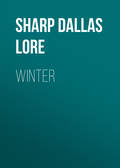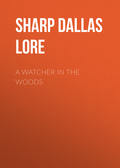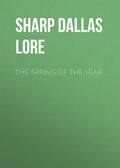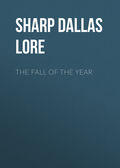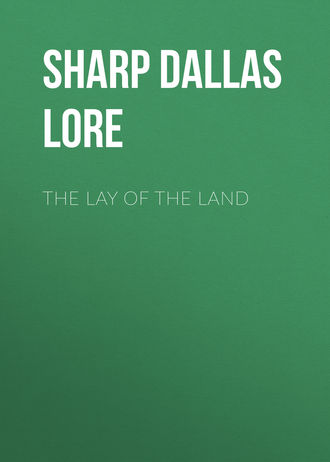
Sharp Dallas Lore
The Lay of the Land
XI
High Noon
Lazily sailing clouds, and between them, far away, the illimitable blue! And how blue! how cool! how far away! Never does the sky seem of so real azure, so fresh and new, but so mysteriously distant, as upon such a July day as this; and never does the earth seem so warm and near. I lie outstretched upon it as close as I ever lay upon my mother’s breast. I feel the crisp moss beneath me, the creeping of the beetle under my shoulder, the heat of the gray stone against my side. I throw out my hands, push my fingers into the hot soil and feel them take root. Mother earth! The clouds sail on; the bending blue recedes; and – heaven? It matters not. Here are my brothers, – the beetle, the moss, the gray stone; and here I lie in the arms of the mother who bore me.
I have questions to ask – to-morrow; dreams to dream – to-morrow; things to do – to-morrow. To-day I am free in the fields; to-day I am brother to the beetle and the stone; I am neighbor to this ancient white oak in whose shade I lie; I am child to the earth. It is enough to be to-day.
How warm is this mother breast, even here, under the tree! The sun is overhead. The summer is at its height. The flood-tide of life has come. It is high noon of the year.
The drowsy silence of the full, hot noon lies deep across the field. Stream and cattle and pasture-slope are quiet in repose. The eyes of the earth are heavy. The air is asleep. Yet the round shadow of my oak begins to shift. The cattle do not move; the pasture still sleeps under the wide, white glare. But already the noon is passing.
Of the four seasons summer is the shortest, and the one we are least acquainted with. Summer is only a pause between spring and autumn, only the hour of the year’s noon. But the hour is long enough were we able to stop, to lie down under a tree for the hour, unwearied, wide-awake, and still.
We can be glad with the spring, sad with the autumn, eager with the winter; but it is hard for us to go softly, to pause, to be still, complete, sufficient, full with the full, sufficient summer; to hang poised and expanded like the broad-winged hawk yonder far up in the wide sky.
But the hawk is not still. The shadow of my oak begins to lengthen. The hour is gone even while it comes, for wavering softly down the languid air falls a yellow leaf from a slender gray birch near by. I remember, too, that on my way through the woodlot I frightened a small flock of robins from a pine; and more than a week ago the swallows were gathering upon the telegraph wires. It was springtime even yesterday; to-day there are signs of autumn everywhere. Perhaps, after all, there is no such time as summer, – no pause, no rest, no quiet in the fields, no hour of noon.
Yet I get something out of the fields, these slumberous July days, that is neither of springtime nor of autumn, a ripening, mellowing, quieting something, that falls only when the leaves hang limp, when the earth warms in the shadows, when the wood-lily opens in the sun, and the whir of the cicada times the throbbing of the heat. And when that something falls, then I know it is summer.
This is a late July day, but its dawn was still of the springtime. At daybreak the birds were singing, fresh and full-throated as in May; then the sun burned through the mist and the chorus ceased. Now I do not hear even the chewink and the talkative vireo. Only the fiery notes of the scarlet tanager come to me through the dry white heat of the noon, and the resonant, reverberated song of the indigo bunting, a hot, metallic, quivering song, as out of a hot and copper sky.
There are nestlings still in the woods. This indigo bunting has eggs or young in the bushes up the hillside; the scarlet tanager but lately finished his nest in the tall oaks; I looked in upon some half-fledged cuckoos along the fence. But all of these are late. The year’s young are upon the wing. A few of the spring’s flowers are still opening. I noticed the bees upon some tardy raspberry blossoms; and yonder, amid the fixed shining colors of the wooded ridge, I see the top of a chestnut tree, misty and tender, with foamy white bloom. These are the last of the season. The July flowering of the chestnut always seems delayed and accidental. The season’s fruit has set, is already ripening. Spring is gone; the sun is overhead; the red wood-lily is open. To-day is summer, – noon of the year.
High noon! and the hour strikes in the red wood-lily aflame in the old fields and in the low thick tangles of sweet-fern and blackberry that border the upland woods.
This is a flower of fire, the worshiper of the sun, the very heart of the summer. How impossible it would be to kindle a wood-lily on the cold, damp soil of April! It can be lighted only on this kiln-dried soil of July. This old hilly pasture is baking in the sun; the mouldy moss that creeps over its thin breast crackles and crumbles under my feet; the patches of sweet-fern that blotch it here and there crisp in the heat and fill the smothered air with a spicy breath; but the wood-lily opens wide and full, lifting its spotted lips to the Sun, for it loves his scorching kiss. See it glow! Should the withered thicket burst suddenly into a blaze it would be no wonder, so little would it take to fan these glowing petals into flame.
The marsh marigolds of May spread the meadows with a glow of warmth, yet that was but a gilded fire beside the wilting, withering heat of this midsummer lily. That early flush has gone. There is hardly a fleck of spring’s freshness and delicacy on the fields, none of the tenderness of the bluets that touched everything in May, none even of the softness of the hardwood greens that lasted far into June. The colors are set now, dry and glistening, as if varnished over. The odors, too, have changed. They were moist and faint then, – the fragrance of the breath of things. Now they are strong, pungent, heavy, – the tried out smells of the sweat of things.
Life has grown lusty and lazy and rank. It stood no higher than the heads of the violets along my little river at the coming of June; to-day I cannot catch a glimpse of the water without breaking through a hedge of swamp milkweed, boneset, and peppermint. Here are turtle-head, joe-pye-weed, jewel-weed, the budding goldenrods, and the spreading, choking, rasping smartweed. The year is full grown. It is strong, rich, luxuriant.
And how erect and unblushing! The pointed spireas, the sumacs, the thistles, this crowd along the river, this red wood-lily, even the tall swaying spray of meadow-rue! Slender, dainty, airy, the meadow-rue falls just short of grace and delicacy. It feels the season’s pride of life. It is angled, rigid, rank. Were there the slightest bend to its branches, the merest suggestion of soul to the plant, then, from root to spreading panicles, there had been more grace, more misty, penciled delicacy wrought into the tall meadow-rue than into any flower-form of my summer.
But the suggestion of soul in the meadow-rue, as in the whole face of nature, is lost in flesh. It is the body, not the spirit, that is now present. She is well fed, well clothed, opulent, mature. She is conventional, – as conventional as a single, stiff spire of the steeple-bush, – turned to such a pointed nicety as to seem done by machine.
And yet the steeple-bush rarely grows as single spires, but by the meadow-full. We rarely see a single spire. We never gather summer flowers one by one, as we gather the arbutus and hepatica of spring. Life has lost its individuality. It is all massed, crowded, communal. The odors mingle now and drift wide on the winds, and as wide on the hillsides spread the colors, gold and green and white, and, where the rocky pasture runs down to the woods, the pink of the steeple-bush, like a flush of dawn.
Across my neighbor’s pasture lies this soft glory of the spireas all through July. It runs in irregular streams down to the brook, rising there into a low-hanging bank of mist where the clustering spires of pink are interspersed with the taller, whiter meadow-sweet, – the “willow-leaved spirea.”
There are shadowy rooms in the deep woods where the spring lingers until the leaves of autumn begin to fall. Here, in July, I can find the little twin flowers Linnea and Mitchella, blossoms that should have opened with the bloodroot and anemone. But Life has largely fled the woods and left them empty and still. She is out in the open, along the roadsides, rioting in the sun. The time of her maidenhood is gone. She is entirely maternal now, bent on replenishing the earth, on reseeding it against all possibility of death. She covers the ground with seed, and fills the very air with seed that the winds may sow. She has grown lusty, bold, almost defiant, no longer asking leave, but claiming for her own the pastures, gardens, waysides, even the dumps and waste places.
Yonder where the cattle feed stands the barbed purple thistle, arrogant, royal, unapproachable by man or beast. “Stand back,” it says, by every one of its thousand nettles; “this field is mine.” How savage and how splendid it is! After the royal purple fades, the goldfinches will dare to come and eat the plumed seeds and scatter them by the million, but even the goldfinch has been known to perish upon the poisoned spikes with which the plant is armed.
As persistent and successful as the thistle, though not as arrogant and savage, grows the wild white carrot in the mowing fields. The courts have called it names and set a price upon its life. It has been pulled out, cut off and burned, – exterminated again and again by statute.
Life snaps her fingers at us in July; lays hold of us, even, as we pass, and makes us carry her burs and beggar’s-ticks for a wider planting. I am as useful as the tail of my cow. Neither the cow nor I ever come home from the July fields without an abundant sowing of stick-tights, tick-seeds, and burdock burs.
There is little beauty, fragrance, or even economic value in this wild, overrunning host of thistles, docks, daisies, plantains, yarrows, carrots, that now possess the earth; but when they crowd out along the dusty roadsides and cover the sterile, neglected, and unsightly places, we can sing, like the good gray poet, “the leaves and flowers of the commonest weeds” in our “Song of Joys.”
There is certainly some praise due the chicory, or blue corn-flower, for it is a waste transformer, a “slummer” among flowers, if ever there was one. Like the daisy, it is a foreigner; but unlike the daisy, its coming is wholly benevolent. It asks only the roadsides, and for these along only the choked, deserted stretches; and where the summer dust lies deepest. Coarse, common, weedy, it doubtless is; but it never droops in the heat, and its blue shines through the smother like azure through the mists of the sky.
The winds and the birds are the sowers of the wayside, and to them I am indebted for this touch of midsummer color. But they miss certain spots along the roads, or else these are the patches that have no deepness of earth, where the seed of the winds’ sowing can get no hold, for I have had to sow these myself. As I go up and down I carry a pocketful of sweet clover seed, – melilotus, – and over every waste and sandy place I scatter a few of the tiny seeds, when, lo! not two blades of grass where one grew before, but a patch of tall white flowers, breathing the sweetness of heaven into all the air, and humming in the July sun with the joyous sound of my honey bees. All this, and for season after season, where nothing grew before!
Along with melilotus in the gravelly cuts and burnt woodlands grows the fireweed, a tall showy annual that waves its pink, plumed head throughout July. Farther north and west, this striking flower, like the melilotus, yields a heavy flow of delicious honey, but it does not attract the bees in this locality. Neither do my bees get any nectar from the fat little indigo-bush that takes possession of the unfarmed, sandy fields in July, though the wild bumblebees are busy upon it as long as it remains in bloom.
But this is not the native land of the honey bee, and it is sheer luck that the white clover, the basswood, the goldenrod, and here in July, the sumac, give down to these immigrant bees their honey-sweets.
High noon of the year! The laggard breeze comes to me now from the maple swamp, slow and sleepy with the odor of the white azaleas; a flock of chickadees stop and quiz me; the quivering click-clack of a distant mowing-machine fills the air with a drowsy hum.
Up to this time I have not seen a black snake, but now one is watching me with raised head from the edge of ferns among the rocks. One step toward him and the lifted, rigid neck, a flashing streak of jet, glides swiftly, evenly, mysteriously away, leaving me with an uncanny feeling of chill.
It, too, is a creature of the sun, as is everything that seems to belong especially to July. Smells, colors, sounds, shapes, are all sun-born. The hum of the insects, the music of the mower, the clear, strong hues of the flowers, the sweet breath of curing hay, the heavy balsamic odors of the woods, – everything seems either a distillation, a vibration, an essence, or some direct, immediate work of the sun.
Has your blood been work and winter faded until it runs thin? Would you feel the pulse of a new life? Come, we will take a day out of July and bask like the wood-lily and the snake; we will sleep for this one day in the blazing, sleeping, living, midsummer sun.
XII
The Palace in the Pig-pen
It is certainly a humble environment. The delicious spring of water, the plenty of wild, cool air, and the clean pavement of loose stones do not surround this home as they did the home of Mr. Burroughs’s phœbes, nor does this look “out upon some wild scene and overhung by beetling crags.” Instead, this phœbe’s nest is stuck close up to the low board roof in my pig-pen.
“You have taken a handful of my wooded acres,” says Nature, “and if you have not improved them, you at least have changed them greatly. But they are mine still. Be friendly now, go softly, and you shall have them all, – and I shall have them all, too. We will share them together.”
And we do. Every part of the fourteen acres is mine, yielding some kind of food or fuel or shelter. And every foot, yes, every foot, is Nature’s; as entirely hers as when the thick primeval forest stood here. The apple trees are hers as much as mine, and she has an average of ten different bird families, living in them every spring. A pair of crows and a pair of red-tailed hawks are nesting in the woodlot; there are at least three families of chipmunks in as many of my stone piles; a fine old tree toad (his fourth season now) sleeps on the porch under the climbing rose; a hornet’s nest hangs in a corner of the eaves; a small colony of swifts thunder in the chimney; swallows twitter in the hayloft; a chipmunk and a half-tame gray squirrel feed in the barn; and – to bring an end to this bare beginning – under the roof of the pig-pen dwell this pair of phœbes.
To make a bird house of a pig-pen, to divide it between the pig and the bird – this is as far as Nature can go, and this is certainly enough to redeem the whole farm. For she has not sent an outcast or a scavenger to dwell in the pen, but a bird of character, however much he may lack in song or color. Phœbe does not make up well in a picture; neither does he perform well as a singer; there is little to him, in fact, but personality, – personality of a kind and quantity, sufficient to make the pig-pen a decent and respectable neighborhood.
Phœbe is altogether more than his surroundings. Every time I go to feed the pig, he lights upon a post near by and says to me: “It’s what you are! Not what you do, but how you do it!” – with a launch into the air, a whirl, an unerring snap at a cabbage butterfly, and an easy drop to the post again, by way of illustration. “Not where you live, but how you live there; not the feathers you wear, but how you wear them, – it is what you are that counts!”
There is a difference between being a “character” and having one. “Jim” Crow is a character, largely because he has so little. That is why he is “Jim.” My phœbe lives over the pig, but he has no nickname like the crow. I cannot feel familiar with a bird of his air and carriage, who faces the world so squarely, who settles upon a stake as if he owned it, who lives a prince in my pig-pen.
Look at him! How alert, able, free! Notice the limber drop of his tail, the ready energy it suggests. By that one sign you would know the bird had force. He is afraid of nothing, not even the cold, and he migrates only because he is a flycatcher, and is thus compelled to. The earliest spring day, however, that you find the flies buzzing in the sun, look for phœbe. He is back. The first of my birds to return in the spring is he, often beating the bluebird and robin by almost a week. It was a fearful spring, the spring of 1904. How phœbe managed to exist those miserable March days is a mystery. He came directly to the pen, as he had come the year before, and his presence in that bleakest of Marches made it almost spring.
The same force and promptness are manifest in the domestic affairs of the bird. The first to arrive that spring, he was also the first to build and bring off a brood, – or, perhaps, She was. And the size of the brood – of the broods, for the second one is now a-wing, and there may yet be a third!
Phœbe appeared without his mate, and for nearly three weeks he hunted in the vicinity of the pen, calling the day long, and, toward the end of the second week, occasionally soaring into the air, flapping and pouring forth a small, ecstatic song that seemed fairly forced from him.
These aerial bursts meant just one thing: she was coming, was coming soon! Was she coming, or was he getting ready to go for her? Here he had been for nearly three weeks, his house-lot chosen, his mind at rest, his heart beating faster with every sunrise. It was as plain as day that he knew – was certain – just how and just when something lovely was going to happen. I wished I knew. I was half in love with her myself, half jealous of him, and I, too, watched for her.
But she was not for me. On the evening of April 14, he was alone as usual. The next morning a pair of phœbes flitted in and out of the windows of the pen. Here she was. Will some one tell me all about it? Had she just come along and fallen instantly in love with him and his fine pig-pen? There are foolish female birds; and there are records of just such love affairs; but this was too early in the season. It is pretty evident that he nested here last year. Was she his old mate, as Wilson believes? Did they keep together all through the autumn and winter, all the way from Massachusetts to Florida and back? Or was she a new bride, who had promised him before he left Florida? If so, then how did she know where to find him?
Here is a pretty story. But who will tell it to me?
What followed is a pretty story, too, had I a lover’s pen with which to write it, – the story of his love, of their love, and of her love especially, which was last and best.
For several days after she came the weather continued raw and wet, so that nest-building was greatly delayed. The scar of an old, last year’s nest still showed on a stringer, and I wondered if they had decided on this or some other site for the new nest. They had not made up their minds, for when they did start it was to make three beginnings.
Then I offered a suggestion. Out of a bit of stick, branching at right angles, I made a little bracket and tacked it up on one of the stringers, down near the lower end of the roof. It appealed to the birds at once, and from that moment the building went steadily on.
Saddled upon this bracket, as well as mortared to the stringer, the nest, when finished, was as safe as a castle. And how perfect a thing! Few nests, indeed, combine the solidity, the softness, and the exquisite curve of phœbe’s.
In placing the bracket, I had carelessly nailed it under one of the cracks in the loose board roof. The nest was receiving its first linings when there came a long, hard rain that beat through the crack and soaked the little cradle. This was serious, for a great deal of mud had been worked into the thick foundation, and here, in the constant shade, the dampness would be long in drying out.
The builders saw the mistake, too, and with their great good sense immediately began to remedy it. They built the bottom up thicker, carried the wall over on a slant that brought the outermost point within the crack, then raised the whole nest until the cup was as round-rimmed and hollow as the mould of the bird’s breast could make it.
The outside of the nest, its base, is broad and rough and shapeless enough; but nothing could be softer and lovelier than the inside, the cradle, and nothing drier, for the slanting walls shed every drop from the leaky crack.
Wet weather followed the heavy rain until long after the nest was finished. The whole structure was as damp and cold as a newly plastered house. It felt wet to my touch. Yet I noticed the birds were already brooding. Every night, and often during the day, I would see one of them in the nest, so deep in that only a head or a tail showed over the round rim. After several days I looked to see the eggs, but to my surprise found the nest empty. It had been robbed, I thought, yet by what creature I could not imagine. Then down cuddled one of the birds again, – and I understood. Instead of wet and cold, the nest to-day felt warm to my hand; it was dry almost to the bottom. It had changed color, too, all the upper part having turned a soft silver-gray. She (I am sure it was she) had not been brooding her eggs at all; she had been brooding her mother’s thought of them; and for them had been nestling here these days and nights, drying and warming their damp cradle with the fire of her life and love.
In due time the eggs came, – five of them, white, spotless, and shapely. While the little hen was hatching them I gave my attention further to the cock.
I am writing this with a black suspicion overhanging him. But of that later. I hope it is unfounded, and I shall give him the benefit of the doubt. A man is innocent until proved guilty. I have no positive evidence of Mr. Phœbe’s wrong.
Our intimate friendship has revealed a most pleasing nature in phœbe. Perhaps such close and continued association would show like qualities in every bird, even in the kingbird. But I fear only a woman, like Mrs. Olive Thorne Miller, could find them in him. Not much can be said of this flycatcher family, except that it is useful, – a kind of virtue that gets its chief reward in heaven. I am acquainted with only four of the other nine members, – great-crest, kingbird, pewee, and chebec, – and each of these has some redeeming attributes besides the habit of catching flies.
They are all good nest-builders, good parents, and brave, independent birds; but aside from phœbe and pewee – the latter in his small way the sweetest voice of the oak woods – the whole family is an odd lot, cross-grained, cross-looking, and about as musical as a family of ducks. A duck seems to know that he cannot sing. A flycatcher knows nothing of any shortcoming. He knows he can sing, and in time he will prove it. If desire and effort count for anything, he certainly must prove it in time. How long the family has already been training, no one knows. Everybody knows, however, the success each flycatcher of them has thus far attained. According to Mr. Chapman’s authority, the five rarer members perform as follows: the olive-sided swoops from the tops of the tallest trees uttering “pu-pu” or “pu-pip”; the yellow-bellied sits upon the low twigs and sneezes a song, an abrupt “pse-ek,” explosive and harsh, produced with a painful, convulsive jerk; the Acadian by the help of his tail says “spee” or “peet,” now and then a loud “pee-e-yúk,” meanwhile trembling violently; Trail’s flycatcher jerks out his notes rapidly, doubling himself up and fairly vibrating with the explosive effort to sing “ee-zee-e-up”; the gray kingbird says a strong, simple “pitirri.”
It would make a good minstrel show, doubtless, if the family would appear together. In chorus, surely, they would be far from a tuneful choir.
I should hate to hear the flycatchers all together. Yet individually, in the wide universal chorus of the out-of-doors, how much we should miss the kingbird’s metallic twitter and the chebec’s insistent call!
There was little excitement for phœbe during this period of incubation. He hunted in the neighborhood and occasionally called to his mate, contented enough perhaps, but certainly sometimes appearing tired. One rainy day he sat in the pig-pen window looking out at the gray wet world. He was humped and silent and meditative, his whole attitude speaking the extreme length of his day, the monotony of the drip, drip, drip from the eaves, and the sitting, the ceaseless sitting, of his brooding wife.
He might have hastened the time by catching a few flies for her or by taking her place on the nest, but I never saw him do it.
Things were livelier when the eggs hatched, for it required a good many flies a day to keep the five young ones growing. And how they grew! Like bread sponge in a pan, they began to rise, pushing the mother up so that she was forced to stand over them; then pushing her out until she could cling only to the side of the nest at night; then pushing her off altogether. By this time they were hanging to the outside themselves, covering the nest from sight, almost, until finally they spilled off upon their wings.
Out of the nest upon the air! Out of the pen and into a sweet, wide world of green and blue and golden light! I saw the second brood take their first flight, and it was thrilling.
The nest was placed back from and below the window, so that in leaving it the young would have to drop, then turn and fly up to get out. Below was the pig.
As they grew I began to fear that they might try their wings before this feat could be accomplished, and so fall to the pig below. But Nature, in this case, was careful of her pearls. Day after day they clung to the nest, even after they might have flown; and when they did go, it was with a sure and a long flight that carried them out and away to the tops of the neighboring trees.
They left the nest one at a time, and were met in the air by their mother, who darting to them, calling loudly, and, whirling about them, helped them as high and as far away as they could go.
I wish the simple record of these family affairs could be closed without one tragic entry. But that can rarely be of any family. Seven days after the first brood were a-wing, I found the new eggs in the nest. Soon after that the male bird disappeared. The second brood has now been out a week, and in all this time no sight or sound has been had of the father.
What happened? Was he killed? Caught by a cat or a hawk? It is possible; and this is an easy and kindly way to think of him. Nor is it impossible that he may have remained as leader and protector to the first brood, or (perish the thought!) might he perhaps have grown weary at sight of the second lot of five eggs, of the long days and the neglect that they meant for him, and out of jealousy and fickleness wickedly deserted?
I hope it was death, a stainless, even ignominious death by one of my neighbor’s dozen cats.
Death or desertion, it involved a second tragedy. Five such young ones at this time were too many for the mother. She fought nobly; no mother could have done more. All five were brought within a few days of flight; then, one day, I saw a little wing hanging listlessly over the side of the nest. I went closer. One had died. It had starved to death. There were none of the parasites in the nest that often kill these birds. It was a plain case of sacrifice, – by the mother, perhaps; by the other young, maybe, – one for the other four.
But she did well. Nine such young birds to her credit since April. Who shall measure her actual use to the world? How does she compare in value with the pig? Yesterday I saw several of her brood along the meadow fence hawking for flies. They were not far from my cabbage patch.
I hope that a pair of them returns to me another spring, and that they come early. Any bird that deigns to dwell under roof of mine commands my friendship; but no other bird takes phœbe’s place in my affections, there is so much in him to like and he speaks for so much of the friendship of nature.
“Humble and inoffensive bird” he has been called by one of our leading ornithologies – because he comes to my pig-pen! “Inoffensive”? this bird with the cabbage butterfly in his beak? The faint and damning praise! And “humble”? There is not a humble feather on his body. Humble to those who see the pen and not the bird. But to me – why, the bird has made a palace of my pig-pen.
The very pig seems less a pig because of this exquisite association; and the lowly work of feeding the creature has been turned by phœbe into an æsthetic course in bird study.



